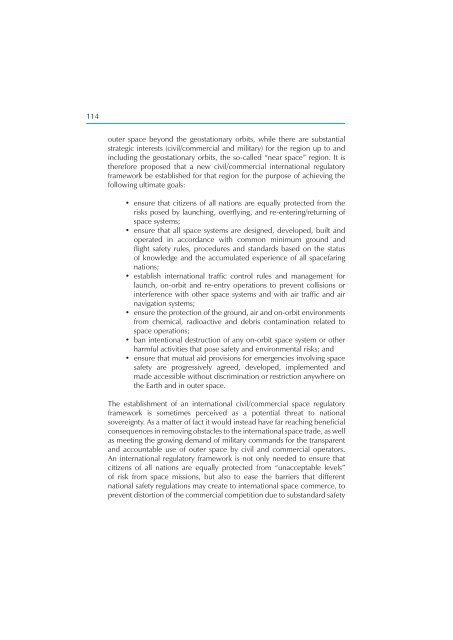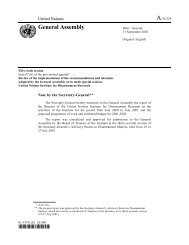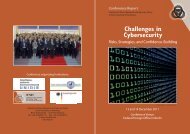Security in Space The Next Generation - UNIDIR
Security in Space The Next Generation - UNIDIR
Security in Space The Next Generation - UNIDIR
Create successful ePaper yourself
Turn your PDF publications into a flip-book with our unique Google optimized e-Paper software.
114<br />
outer space beyond the geostationary orbits, while there are substantial<br />
strategic <strong>in</strong>terests (civil/commercial and military) for the region up to and<br />
<strong>in</strong>clud<strong>in</strong>g the geostationary orbits, the so-called “near space” region. It is<br />
therefore proposed that a new civil/commercial <strong>in</strong>ternational regulatory<br />
framework be established for that region for the purpose of achiev<strong>in</strong>g the<br />
follow<strong>in</strong>g ultimate goals:<br />
ensure that citizens of all nations are equally protected from the<br />
risks posed by launch<strong>in</strong>g, overfl y<strong>in</strong>g, and re-enter<strong>in</strong>g/return<strong>in</strong>g of<br />
space systems;<br />
ensure that all space systems are designed, developed, built and<br />
operated <strong>in</strong> accordance with common m<strong>in</strong>imum ground and<br />
fl ight safety rules, procedures and standards based on the status<br />
of knowledge and the accumulated experience of all spacefar<strong>in</strong>g<br />
nations;<br />
establish <strong>in</strong>ternational traffi c control rules and management for<br />
launch, on-orbit and re-entry operations to prevent collisions or<br />
<strong>in</strong>terference with other space systems and with air traffi c and air<br />
navigation systems;<br />
ensure the protection of the ground, air and on-orbit environments<br />
from chemical, radioactive and debris contam<strong>in</strong>ation related to<br />
space operations;<br />
ban <strong>in</strong>tentional destruction of any on-orbit space system or other<br />
harmful activities that pose safety and environmental risks; and<br />
ensure that mutual aid provisions for emergencies <strong>in</strong>volv<strong>in</strong>g space<br />
safety are progressively agreed, developed, implemented and<br />
made accessible without discrim<strong>in</strong>ation or restriction anywhere on<br />
the Earth and <strong>in</strong> outer space.<br />
<strong>The</strong> establishment of an <strong>in</strong>ternational civil/commercial space regulatory<br />
framework is sometimes perceived as a potential threat to national<br />
sovereignty. As a matter of fact it would <strong>in</strong>stead have far reach<strong>in</strong>g benefi cial<br />
consequences <strong>in</strong> remov<strong>in</strong>g obstacles to the <strong>in</strong>ternational space trade, as well<br />
as meet<strong>in</strong>g the grow<strong>in</strong>g demand of military commands for the transparent<br />
and accountable use of outer space by civil and commercial operators.<br />
An <strong>in</strong>ternational regulatory framework is not only needed to ensure that<br />
citizens of all nations are equally protected from “unacceptable levels”<br />
of risk from space missions, but also to ease the barriers that different<br />
national safety regulations may create to <strong>in</strong>ternational space commerce, to<br />
prevent distortion of the commercial competition due to substandard safety








